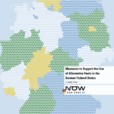No later than when technologies become part of reality, respective legal regulations are required, both nationally and internationally. Close coordination is particularly important at the multilateral level when developing the legal framework. This exists in the European Union. The results of these coordination processes include the EU directives outlined below.
NOW supports the BMVI in negotiations in the Council of the European Union about directives and regulations as well as acts of tertiary legislation in the area of transport, energy and climate protection. To be able to take concerted action with other EU member states in the development of alternative fuel infrastructures and many more topics, the NOW is part of the Government Support Group (GSG) and together with the Dutch authority of Rijkswaterstaat, heads up the secretariat.
Aside from EU legislation, the NOW also monitors relevant regulatory developments in many European countries and engages in close bilateral exchange with many of them.
Directive 2014/94/EU of the European Parliament and the Council of 22 October 2014 on the deployment of alternative fuels infrastructure
The AFID creates the framework for the development of an alternative fuels infrastructure in Europe, including electricity for electric vehicles as well as hydrogen for fuel cells and LNG for shipping.
The first step in national implementation is the preparation of a National Strategy Framework. In addition to documenting the status quo, this includes the definition of a quantity structure for the infrastructure and the associated measures required for achieving this objective. With the cabinet decision of 9/11/2016, the federal government adopted the German National Strategy Framework. The National Strategy Framework was communicated to the EU Commission on time on 18/11/2016.
Furthermore the NOW supports the BMVI in establishing continual monitoring for the alternative fuels area. This provides regular reporting on AFID implementation to the European Commission.
Directive (EU) 2018/2001 of the European Parliament and of the Council of the European Union of 11 December 2018 on the promotion of the use of energy from renewable sources
The directive on the promotion of renewable energies (RED II) establishes a binding EU target of at least 32% renewable energies by 2030. Within the same time period, 14% of fuel used in transport is to be renewable. This objective can be fulfilled by fuel providers through putting renewable electricity on the market, green hydrogen, synthetic fuels or advanced and conventional biofuels.
Dependent on national implementation in the Federal Immission Control Act, the directive has a particularly large influence on the market for green hydrogen. On the basis of the directive, criteria for the integrated offsetting of green hydrogen as well as a provision for its proof of origin will be established.
The NOW accompanied the legislative process on the European level and supports the federal government in its transposition into national law.
Directive (EU) 2019/116 of the European Parliament and of the Council of 20 June 2019 amending Directive 2009/33/EC on the promotion of clean and energy-efficient road transport vehicles
The CVD establishes definitions for “clean vehicles”, differentiates according to vehicle classes and issues goals to member states for their procurement for two reporting periods. There are very ambitious goals for Germany: 38.5% clean cars and light commercial vehicles (both time periods), 10% clean trucks by 2025 (15% by 2030) as well as 45% clean buses by 2025 (65% by 2030).
In this context NOW provides support to the government using its expertise gained in the programmes relating to funding low-emission and emission-free buses as well as municipal concepts.


